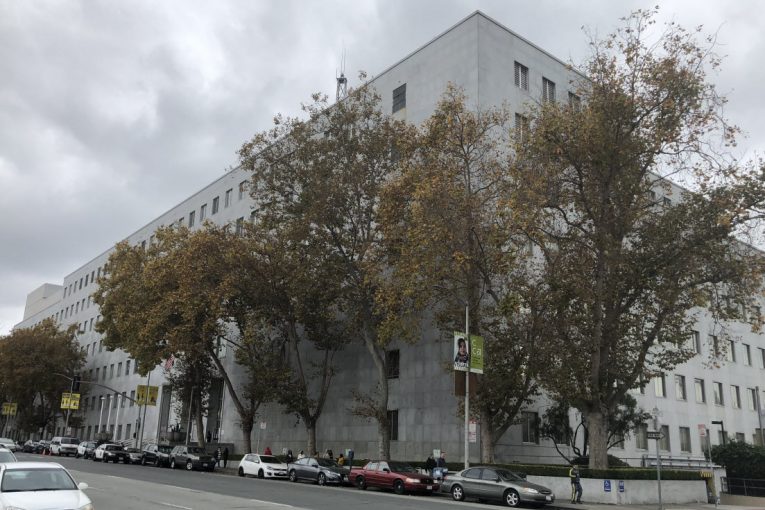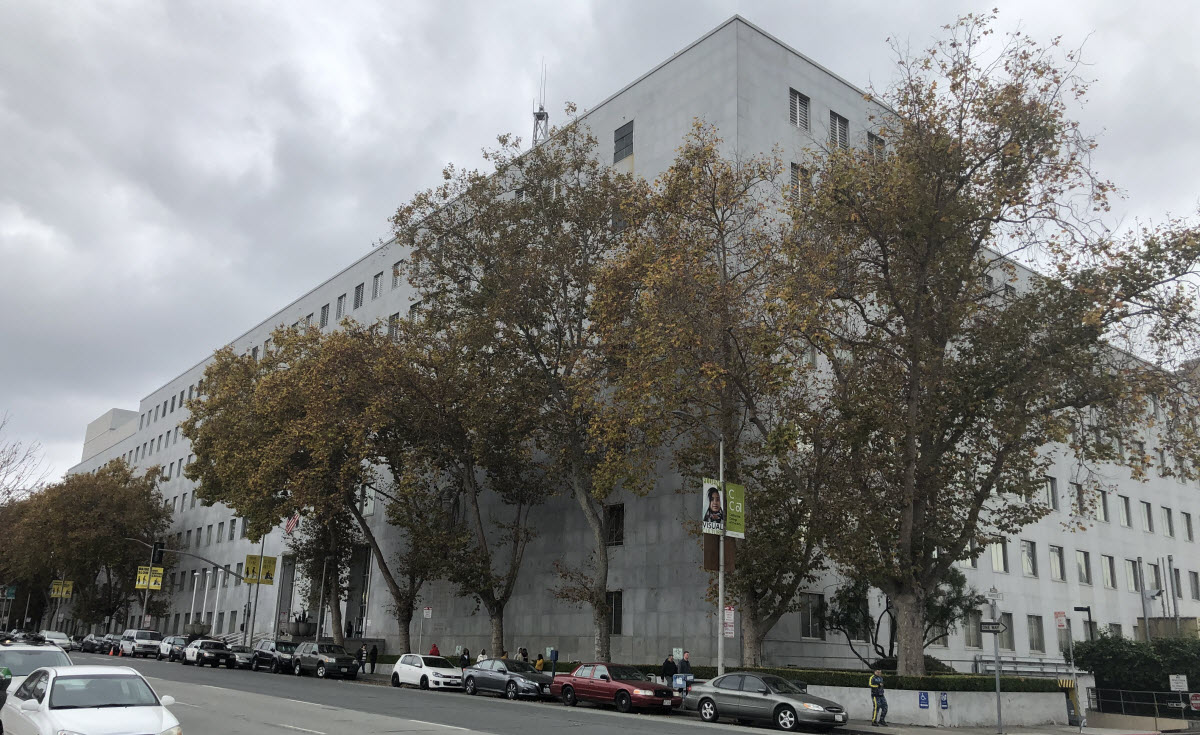

By Janeek Mollique and David Greenwald
SAN FRANCISCO – Last summer, Tyler Gress was convicted of battery on a police officer and resisting arrest for a February 2019 confrontation with an off-duty officer. He was accused by the loss prevention officer of taking merchandise and then caught on video throwing a punch that knocked him down.
For the offense, he was sentenced to eight years in prison, which Deputy Public Defender Jamie Longorio thought was excessive.
Meanwhile, newly-elected District Attorney Chesa Boudin, who was in attendance for the re-sentencing hearing, heard it from both sides.
Mr. Longoria had argued during the trial, complaining that his client had acted in self-defense and did not realize he was dealing with law enforcement during the incident. Meanwhile, the police argued that he should have received an even harsher penalty.
Mr. Longoria noted that Mr. Boudin, a former colleague, did not take a position in the re-sentencing hearing. He believed his client should have been given probation rather than a lengthy eight-year sentence in the case.
The police on the other hand took the opposite view, calling it another “Boudin blunder” and tweeted, Mr. Boudin “refuses to contest the defense attorney’s request for a significant reduced sentence against the defendant who attacked our officer.”
“Take a cheap shot at a cop and knock him out?” the SFPOA tweeted. “Reduce his sentence!”
The resentencing hearing in the case against Tyler Gress regarding his past conduct of hitting a San Francisco Police Officer took place today on Feb. 19, 2020, with Judge Vedica Puri presiding.
Mr. Longoria began the hearing by posing to the judge a possible re-sentencing that consisted of an intensive supervised court program in which Mr. Gress would be on ankle monitor and subjected to other court supervised orders. Longoria reminded the judge of Mr. Gress’s past criminal history, asserting that Mr. Gress had only one juvenile case, and two burglary-type convictions—in which one was reduced to a misdemeanor, and the other charge is eligible for relief to also be reduced under Proposition 47 as a matter of law.
He further stated that Mr. Gress does not have a serious or violent criminal history, nor does he have any recent or previous convictions for any similar conduct like that of the current matter.
Mr. Longoria took a moment to speak directly to Judge Puri in an effort to support his desired form of retribution for his client, and noted that case law even displays situations where crimes have been 100 times more violent and serious and yet those types of cases entertained the possibility of an intensive supervised court program as a suggestive sentencing.
He further argued that, even if the court feels that Mr. Gress is presumptively ineligible for probation, the court should give thought to the facts of the case and weigh in factors such as Mr. Gress returning the scene of the act and surrendering himself, and Mr. Gress’s lack of knowledge as to his ability to actually knock the officer out when striking him only once.
Mr. Longoria highlighted that the current sentence in place, eight years, is the maximum time for an act of this nature.
To give Mr. Gress this amount of time tells the court that punching an officer in the face is the worst act that can be done, and Mr. Longoria contends that this is absolutely not true. Essentially, in the eyes of zealous advocate Jamie Longoria, Mr. Gress could have done more than punch the officer, and he could not have come back and turned himself in since he was going to receive the maximum sentence either way.
Mr. Longoria described Mr. Gress’s upbringing as a potential mitigating factor to consider in the re-sentencing of his client. He shared with the court that his parents were addicted to drugs, leaving him with no one to love and care for him. His only brother who provided for him left to go into the Marines in an attempt to find an escape from the life that their parents provided them. Mr. Longoria told the judge that he could relate because he too had similar experiences and it was the Marines that “saved [his] life.” Mr. Gress was not afforded the same opportunity as his brother or as Mr. Longoria, because his own drug abuse left him with a stained criminal record.
The court gave Mr Gress the opportunity to speak to the court about himself. He informed the court that he was raised by parents who were methamphetamine addicts, and his only familial support was provided by his older brother. His older brother, however, left for the Marines when Mr. Gress was only 11 years old, leaving Mr. Gress with no one to provide any support, love, or stability for him.
This is when Mr. Gress was introduced to a new crowd that he believed to be friends, and they introduced him to the drug that would change his life forever: methamphetamine. Mr. Gress pled to the court that his substance abuse has hurt his friends and family and now it has caused him to hurt a police officer.
After briefly leaving the court, Judge Puri returned with a decision. She reminded the court that it is the judge’s job to reach very hard, well thought out decisions without fear of backlash. It is a judge’s duty to “protect the public and have mercy.”
Judge Puri told the defense counsel that the Tyler Gress that she saw during today’s re-sentencing hearing was not the Tyler Gress that she saw during trial. She said that the type of plea and information that was heard at this re-sentencing hearing should have been heard at trial, but instead the focus was that the officer was the aggressor, which the judge felt was not portrayed by the video evidence.
She further stated that Mr. Gress has had past repeated chances on probation for other conduct, all which were unsuccessful. The judge ultimately chose to not vacate the eight-year sentence, as she found it was fit for such “violent conduct.”
Deputy Public Defender Mano Raju told the media after the hearing: “We are very disappointed in the ruling by the judge.
“This was Judge Puri’s first trial and the first time she sentenced someone in a contested hearing,” Mr. Raju said. “At a time when judges across the country are moving towards rehabilitation and drug treatment, it’s concerning that she would send a 27-year-old with no history of violence to prison for the maximum possible term of eight years, for a single punch with no permanent injury. It’s even more tragic that this entire incident stemmed from Tyler being mistakenly suspected of stealing.”
To sign up for our new newsletter – Everyday Injustice – https://tinyurl.com/yyultcf9







This is an important piece in regard to Chesa Boudin’s new position as District Attorney. If I can make what I hope will be seen as positive criticism, there is information missing that feels important to being able to make an objective assessment of what occurred. I understand that Tyler Gress was convicted-but was it proven in court that he knew he was hitting an officer? I’m assuming this was a jury trial, but was it?
I’m not suggesting that even if he knew he hit an officer that he should be given 8 years. This does seem excessive. However, I do want to know what the PC charges were at the end. And were strikes imposed?
I do think this is important coverage, but I also feel you need to give more precise details. These issues encompass more than whether Chesa is fulfilling his promises, there are also strikes laws on the books that may be impacting this. My suggestion is move away from “opinion” and more into hard facts.